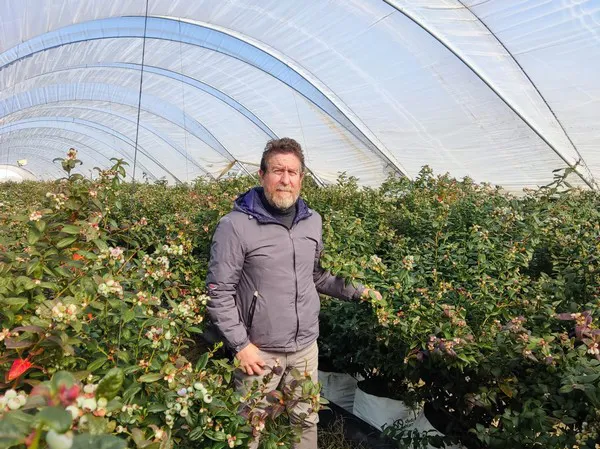The province of Huelva increased its blueberry area by 2% this campaign, accounting for 30.5% of the 11,802 hectares of berries that have been planted for the 2022/2023 campaign.
"We started harvesting our blueberries in Perlahuelva yesterday," stated Ramon Hernandez. "We grow Matias, Windsor, and Star varieties to try to cover the six months of the campaign. We also have some Legacy that we grow outdoors, and that is harvested in summer." In fact, this variety, as well as the later ones, could become very interesting for Huelva's campaign, stated the general director of Perlahuelva.
"The sector, in general, is looking for new windows outside of April and May (the months in which the province's production peaks) as the market is unable to absorb all the volume that is harvested at the same time. Legacy, for example, has its harvest window in June and July, some months that have historically been filled with fruit from Portugal, Northern Spain, and European productions."
"On that date, there is competition from more origins, including Poland, which has a very strong blueberry production. However, that's nothing compared to February, March, and April (even though in these months we only have competition from Morocco)," he stated.

"There was a time when the blueberry achieved good prices (up to 9 euros per kilo) in December and January, but now those price peaks are disappearing. Blueberry prices have stabilized, and since the overseas fruit began to reach the European market in October, they no longer rebound at any time as they did years ago. If they do, it's only a small increase. In April and May, they totally collapse. In those months, even the price differential has dropped to 2-3 euros. Four years ago, 5.5 euro per kilo was a low value, and now they can fall to about 3.5 euro."
Morocco is the biggest competitor for Spain's blueberry in those months, and their production is growing exponentially. "I think Morocco is going to take the lead in the European blueberry market. The big players in the industry are moving there, and huge areas of blueberries are being established in the country, unlike here in Huelva, where it is mainly grown by small and medium farmers," Ramon stated. "Blueberry is becoming a volume business, and if it continues like this, it will eventually become a commodity."
"We need our leaders to be aware that we are a strategic sector"
The whole of the Andalusian fruit and vegetable industry is continuously working to improve the competitiveness of this activity, which has great social and economic importance in the autonomous community. Andalusia is a leading exporter of fruits and vegetables; according to the latest statistics from Extenda, Andalusia accounted for more than 40% of Spanish fruit and vegetable exports between January and October 2022. Huelva was the second-largest exporting province, in no small part thanks to its berry sector. However, as a result of the increasing impact of imports, as in the case of blueberries, the sector is looking to the future with some concern.
"We need our leaders to be aware that we are a strategic sector and that the agricultural sector can follow the steps of other sectors, such as the textile sector, which left Spain for other countries impoverishing our productive capacity. As a result, in the pandemic, we realized that we don't even have the ability to produce masks."
"There should be a greater commitment to make hydraulic policies and to carry out greater investments in technology for agriculture, which are as necessary and strategic as the sector itself. Feeding ourselves is the one basic thing we'll continue to do throughout our whole lives, and all food comes from agriculture," Ramon stated.
For more information:
Perlahuelva Fruits Export S.L.
Calle Zalema, 14
21720 Rociana del Condado, Huelva (España)
Tel.: +34 610 728 319
perlahuelva@perlahuelva.com
https://perlahuelva.com
